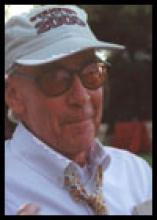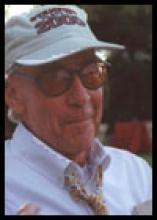Larry Zaroff came into my life on a Thursday afternoon, the first week of my freshman year at Stanford. I walked into Larry’s class, “Becoming a Doctor: Readings from Medical School, Medical Training, Medical Practice,” apprehensive but excited. I had been pre-med ever since I could remember, but the year before, I had gone through some serious soul-searching (or as serious as it could be for a 17-year-old), questioning my ability to become a good doctor or even get to medical school.

But here was Larry, with his ever-present green Elmo cap, who told us that it was ok to question ourselves, that we had potential. Larry, who made us stand up in front of the class, and pushed us to answer enigmas like, “What is the meaning of life?” and “What makes a good doctor?” Larry, who invited a panel of successful women doctors to attend a class, acknowledging the unique obstacles faced by women in medicine. And most of all, Larry, who taught us the importance of empathy, of doctor-patient relationships, of being attuned to our mental health — skills essential to becoming a good doctor, but also to becoming a good person.
It was the only class I ever had where we were not allowed to take notes, but I believe that I have never learned so much about myself and about medicine anywhere else.
My favorite part about the class, however, was that Larry asked for three papers, and he insisted that they all be fictional. I had dreamt of becoming a novelist for as long as I had dreamt of becoming a doctor. But throughout my academic experience, creative writing had largely been traded for pragmatic persuasive essays or literary analyses, and I never had time to write for fun. Larry gave me the opportunity to write for myself, once again, and I was amazed when he actually liked the poetry and short stories I turned in. I admired Larry as a writer, particularly his stint as a New York Times columnist, and his praise of my writing validated the hopes I had always carried.
I only met with Larry one-on-one once, because he required that all of his students have a short private meeting with him within the first few weeks of class. I met him in his office and we talked about our favorite books. He asked me how I was doing, what classes I was taking. I told him about chemistry, and he cringed sympathetically, reflecting, I supposed, on decades worth of pre-med students complaining to him about chemistry. My first college exam and first Chem 31A midterm was the next week, and I told him how nervous I was. He reassured me, “Plenty of my students have struggled with chemistry and become great doctors. There is no correlation.” Before I left, he asked me to email him my exam results.
I got my results back the next Friday, astounded at the A- I had managed to pull. I emailed Larry, and he wrote back in his familiar, punctuation-less, short syntax: “I am proud of you. Don’t let up in chem.”
I nearly cried.
I was always told that Stanford would be this amazing place, where I would make strong faculty-student bonds and lasting relationships. No one ever told me about the freshman angst of struggling to keep up in college-level classes and awkward attempts at making friends. But every Thursday, I could count on Larry asking questions that were important to me and teaching me about medicine, ethics and the humanities — everything that I always wanted to learn. In Larry, I found a mentor and a teacher who truly cared about me, when I had never felt so alone in my life.
This quarter, I am in another of Larry’s classes, “Novels and Theater of Illness.” I was supposed to meet with him for another required meeting the day after I received news of his passing. I wish that I had met with him beyond the required meetings; there are too many questions I have left unasked.
While writing this post, I Googled Larry, hoping to know more about him, realizing belatedly that I didn’t know enough. The results were amazing. From an artist’s blog to his New York Times articles, Larry has left his permanent mark on the Internet. Everywhere, I came across stories and poems that his past students wrote for his class, as well as achievements and awards garnered with thanks to Larry.
Compared to the many students that Larry has taught over the years, I didn’t know him for very long. But I do know that Larry has left an indelible mark on me and on the world, and I was so, so lucky that he accepted me into his Introductory Seminar class last fall. His complete faith in my potential, as both a doctor and a writer, pushed me to reach for my full potential. I would not be writing for Lomita if not for him.
During our class last fall, we spent a day, during our unit on “Death and Dying,” discussing how to lead good lives. At Stanford, it is easy to forget, amidst the palm trees and sunshine, that the real world awaits. The “bubble” is very real. Larry’s passing, and the amazing life he led, reminded me to not get lost in 20-unit quarters and the fear of not becoming “successful.” Rather, the ultimate goal should always be to lead good lives, leaving positive legacies and kindness in our paths.
I am certain that Larry led a good life, and I am so grateful and lucky to have had his presence in mine.
Contact Samantha Wong at slwong ‘at’ stanford.edu
